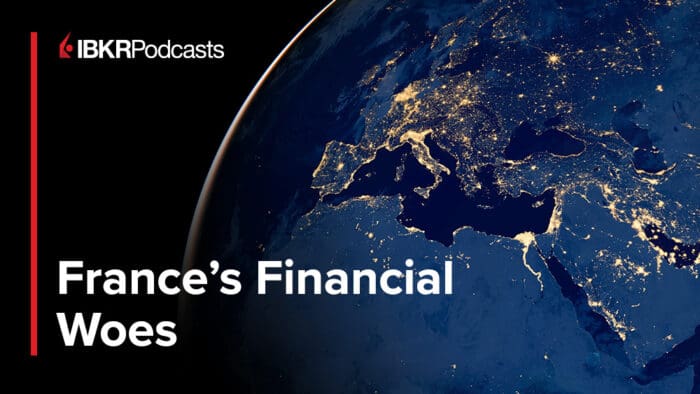In this episode of IBKR Podcasts, host Andrew Wilkinson speaks with Erik Norland, Chief Economist at CME Group, about the current political and economic landscape in Europe. They discuss the implications of recent elections in France and the UK, the ECB’s monetary policy, and the potential impacts of demographic shifts on national debts.
Summary – IBKR Podcasts Ep. 176
The following is a summary of a live audio recording and may contain errors in spelling or grammar. Although IBKR has edited for clarity no material changes have been made.
Andrew Wilkinson
Welcome to this edition of IBKR Podcasts, and I’d like to welcome Eric Norland, who’s the CME Group Chief Economist over in London. Eric, how are you?
Erik Norland
I’m fine, how are you?
Andrew Wilkinson
I’m enjoying the summer. I hope you’re not getting too much rain over in London. That’s another problem. That’s your problem, not mine.
Erik Norland
It has been a little chilly at times. We had a nice weekend, so we’ll take it.
Andrew Wilkinson
I’m here in the United States, and it’s been beautiful weather for the summer, so I’m glad we traded spaces.
When we last spoke, Eric, the French and UK elections were looming large, casting a pall over the investment landscape, but the far right failed to make too much inroad into French politics, and the UK election came and went as we’d expected.
Is it fair to say that political risk is gone at this stage?
Erik Norland
I don’t know if political risk is ever really gone, but in the United Kingdom, anyway, it seems like it’s at a relatively low level. You have labor now with a very large majority in the House of Commons.
And presumably there’s not going to be another election here for another five years. so that provides them a lot of latitude to enact policies. Now, how the markets interpret those policies over time can change. For the moment, they seem to be relatively cautious and incremental, so the market seems to be very calm at the moment when it comes to GILTS, and other UK interest rate products.
France is another story. As you rightly point out, the far right did not turn out to take a majority in the National Assembly. The problem is that there is no majority in the National Assembly. So you have the various left wing groups in the Nouveau Front Populaire that have taken about 35% of the seats, which are now the largest bloc, but they’re not even in agreement among themselves as to who to put forward for Prime Minister.
Then you have Emmanuel Macron’s Centrist Bloc, the second largest group. And then you have the National Front or National Rallies, it’s now called, the third largest group.
And then the fourth largest group, relatively small, but, you have Les Républicains, which is the traditional center right party. It also has maybe 8% of the seats, and so basically nobody’s anywhere near close to a majority. And the country is in political paralysis at a time when it is running a 5.5% of GDP budget deficit and has very high public and private debt ratios.
So I think all of this is a pretty significant concern.
Andrew Wilkinson
Yeah, I’d say. Let’s talk a little bit more about Europe. At its July meeting, the ECB left monetary policy unchanged at 3.75%. That’s about a point and a half under US Federal Reserve policy level.
Governor Christine Lagarde sounded fairly ambivalent towards further rate cuts, reductions in September, but Erik, can you frame the economic landscape and tell us whether the European economy requires additional monetary easing for 2024?
Erik Norland
The European economy has been basically stagnating and going sideways now for quite a long time. You have some countries that are in very mild recessions, almost imperceptible recessions where GDP is growing at a slightly negative rate, but you’re not seeing a huge rise in unemployment.
You might put Germany in that category, for example.
You have other economies like France that continue to grow slowly in Italy, but they’re stoked up by massive public deficits, 5.5% of GDP in the case of France, 7.1% of GDP in the case of Italy. And you have an economy stagnating.
At the same time, inflation rates are coming down. Part of the reason why the ECB didn’t raise as much as the Fed is because they don’t have quite as much of inflation as the United States has.
And their inflation rate’s been coming down a little bit faster. So they didn’t raise as much as the Fed and now they’ve gotten off to a faster start when it comes to rate cuts.
You rightly point out that Christine Lagarde has left the September meeting completely open to the possibility of either leaving rates unchanged or perhaps cutting again. It will be interesting to me to see if the Fed somehow tips the balance here as it looks increasingly likely that the Fed is going to cut rates in September.
It’s not a done deal but that’s what the Fed has suggested. That’s what our Fed funds and SOFR futures are largely pricing with a probability of, around 90% or 95%.
Those probabilities, of course, can change. We have a lot of data to come out between now and September. If the Fed does go in September, does that tip the ECB into another rate cut, irrespective of the state of the European economy or how it evolves? I think it’s an open question.
Andrew Wilkinson
Just sticking with the Fed there, is there a likelihood that they could be accused of influencing the election or at least the economy by moving ahead of the November election?
Erik Norland
That’s what really surprises me about the market’s view of the timing of this. The market seems fairly confident that they’re going to cut in September at the moment. Now, market pricing, again, can change and it has indeed changed a lot this year, early this year the market was pricing six rate cuts or five rate cuts for 2024.
Now it’s pricing maybe one or two rate cuts. The idea that they would cut in September does surprise me a little bit. But, I guess that their view maybe is that rate cuts could be warranted. And so, they have to think about doing it irrespective of the timing.
If you had asked me a couple months ago, I would personally have thought it was more likely they might cut in November than in September. But I guess they’re willing to take the risk of being accused of political interference.
Andrew Wilkinson
I would tend to agree with that view.
Let’s turn back to Europe and let’s talk about debt and demographics and the intersection thereof. There’s a lot of debt in France, Germany, Italy, and so on, but it’s not exactly evenly distributed, is it?
What are your thoughts on how the aging population of such countries could ever make good on their debts over time?Is it really possible, Eric?
Erik Norland
I think it really depends on the country, but first of all, the Eurozone doesn’t really have a sovereign bond market. It has a government bond market that behaves more like the municipal bond market in the U.S. We have a bunch of countries issuing debt into the same currency that none of them control because it’s controlled by the ECB.
Now within Europe, you have very different demographic situations. You have some countries like France, Belgium, and the Netherlands. They have relatively healthy demographics. They have a lot of young people. The demographic pyramids are not brilliant, they’re not like, say, in Africa or in India, where you have a huge base of young people and a small group of old people, they’re more like in the United States, where you have a uniform block of, age, just, number of people from zero to sixty, and then it kind of, tails off after that.
Among the countries with healthy demographics, the one country that has unhealthy levels of debt is France. France has a lot of public sector debt and even more private sector debt. So when interest rates were zero, that wasn’t a problem. We’re going to find out over the next few years whether it’s a problem.
Now that interest rates, are up to 375 where they had been at four, maybe they’ll come down to 350.We’re going to find out if this is a problem for France or not.
Then you have another group of countries, including some highly indebted countries like Italy that have population demographics that look almost like inverse pyramids, where you have tiny numbers of young people, huge numbers of people getting ready to retire or already in retirement, and you really have to wonder how a country like Italy is going to make good on its long term commitments to its bondholders with such a tiny number of young people in the country.
And in a number of other countries, the same thing is true in Portugal and Spain, although their debt levels are not quite as high as Italy. At least not public sector debt. Greece is in a little bit the same situation, as is much of Eastern Europe.
When you have a ton of debt and you have a really small population of people in the workforce and you have a huge number of retirees, it really makes you wonder about the viability of some of the long-term debt.
Like I have no doubt that, at least the short-term debt that’s coming into maturity, say in the next two or five years is likely to be paid off in full.When you look at things like 15, 20, 30-year bonds it really does make you wonder.
Andrew Wilkinson
Yeah, it’s a vexing question. Erik Norland, Chief Economist at CME Group over in London. Thank you very much indeed for joining me today.
Erik Norland
Thank you.
Andrew Wilkinson
And to the audience, don’t forget to subscribe to the series wherever you download your podcasts from. Thanks, Erik.
Join The Conversation
For specific platform feedback and suggestions, please submit it directly to our team using these instructions.
If you have an account-specific question or concern, please reach out to Client Services.
We encourage you to look through our FAQs before posting. Your question may already be covered!
Leave a Reply
Disclosure: CME Group
© [2023] CME Group Inc. All rights reserved. This information is reproduced by permission of CME Group Inc. and its affiliates under license. CME Group Inc. and its affiliates accept no liability or responsibility for the information contained herein, including but not limited to the currency, accuracy and/or completeness of this information, and delays, interruptions, errors or omissions. This information is an unofficial copy and may not reflect the official and accurate version. For the definitive and up-to-date version of any of this information, please see cmegroup.com.
Disclosure: Interactive Brokers
The analysis in this material is provided for information only and is not and should not be construed as an offer to sell or the solicitation of an offer to buy any security. To the extent that this material discusses general market activity, industry or sector trends or other broad-based economic or political conditions, it should not be construed as research or investment advice. To the extent that it includes references to specific securities, commodities, currencies, or other instruments, those references do not constitute a recommendation by IBKR to buy, sell or hold such investments. This material does not and is not intended to take into account the particular financial conditions, investment objectives or requirements of individual customers. Before acting on this material, you should consider whether it is suitable for your particular circumstances and, as necessary, seek professional advice.
The views and opinions expressed herein are those of the author and do not necessarily reflect the views of Interactive Brokers, its affiliates, or its employees.

















Thank you
Thanks for engaging!